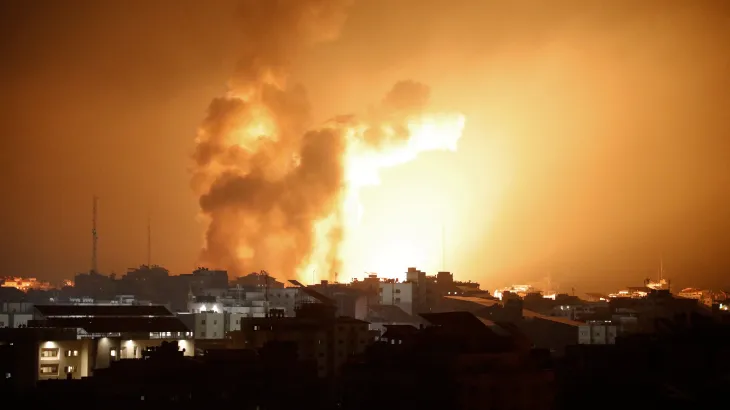Was the October 7th Hamas attack on Israel just or unjust? This necessitates considering conflict evolution and regulation.
Since the dawn of civilization, humans have formed communities. While cooperation helped them survive hostile environments and overcome collective challenges, conflicts also began to emerge. These conflicts arose for various reasons, including resource distribution, territorial control, and power struggles to improve social status within emerging social hierarchies. When conflicts escalated beyond the reach of negotiations or peaceful resolutions, violence became inevitable, leading to the use of force between parties.
Evolution of Conflict and Regulation in Human Societies
To regulate this use of force, communities developed ethical frameworks, which evolved into moral laws and eventually legal statutes. These laws or frameworks were comprehensive and formed early to function within communities, with overarching authorities to enforce them. However, developing laws to regulate force and violence between different groups and communities lagged. The lack of consensus on a framework and the absence of a binding authority to enforce it were key reasons why such frameworks didn’t become mainstream.
The Just War Theory
Despite this, philosophers and thinkers since antiquity have proposed such frameworks. While vague ideas existed in the philosophies of Aristotle and ancient Chinese traditions regarding moral rules during war, Saint Augustine first proposed a comprehensive framework known as the Just War theory. The significance of the Just War theory lies in its ability to guide third parties, not directly involved in a conflict but affected by it, in deciding their stance. In this regard, the Just War theory set a crucial precedent. Similarly, it pushes the parties to adhere to the norms of the conduct of war to claim the moral high ground and garner support for their cause.
October 7th Hamas Attack on Israel
The October 7th Hamas attack on Israel and Israel’s invasion of Gaza in response sparked a new international debate. Hamas claims it waged war in response to Israeli atrocities and to protect Palestinian national interests, while Israel views the attack as terrorism driven by antisemitism.
Also See: HIFPA: Will it Reshape Global Alliances or Amplify Diplomatic Tensions?
Jus Ad Bellum: Right to War
Here it is notable that one main division of the Just War theory is Jus Ad Bellum (Right to War), which determines if a war is just. This principle dictates that a war must be waged by a legitimate authority and publicly declared. Hamas won the last Palestinian election (both Gaza and the West Bank) in 2006. Although their term ended long ago with no new elections held, Hamas still governs the Gaza Strip, having won most seats in Gaza’s 2006 elections. Additionally, many polls show Hamas as the most popular organization in Gaza, with rising popularity in the West Bank, as more Palestinians view it as their best representative.
Before the attack, Hamas announced the commencement of the Al Aqsa Flood Operation on the morning of October 7, 2023, fulfilling the first Jus Ad Bellum requirement.
Just Cause and Probability of Success
The next Jus Ad Bellum postulate is a ‘Just Cause’. Hamas officially stated it waged war in response to Israeli atrocities in Gaza and the West Bank, illegal Israeli settlements, and to end the Israeli occupation of Palestine. International law and moral grounds allow national or sub-national groups to resist foreign occupation and protect their land, thus fulfilling this criterion. The next postulate considers the ‘probability of success’ as a necessary factor in justifying war. Hamas cannot win a full-scale conflict with Israel, which has a well-funded, proper army, while Hamas relies mostly on in-house capabilities and minimal support from Iran.
October 7th Hamas Attack on Israel: Violence as a Last Resort

However, winning the war was never Hamas’s stated goal.
According to Khalil Al Hayya, a senior Hamas leader, “We succeeded in putting the Palestinian issue back on the table.” The main goal was to revive the Palestinian issue internationally. Hamas succeeded, drawing international attention to the conflict and overshadowing the Russo-Ukrainian war.
Although a struggle for statehood and self-determination often cannot match a state’s capabilities, it is justified by factors like international support, the cost of war for the opponent, norms, values, and identity, all contributing to its potential success.
The last postulate is that violence must be a ‘Last Resort’. In the case of the October 7 attack, this postulate has some ground but rests on a shaky foundation.
Some argue that despite repeated engagements and peace talks, the Palestinian issue remains unresolved. Israel continues to seize Palestinian lands, build settlements, and commit atrocities like illegal detentions, torture, and movement restrictions in the West Bank. However, Israel has also signed the Oslo Accords, allowing the formation of the Palestinian Authority and recognizing it as a legitimate entity.
Israel unilaterally withdrew from Gaza in 2005, ended its settlements there, supplied water and electricity, allowed foreign aid through its channels, permitted around 17,000 Gazan citizens to work in Israel, and engaged in peace talks with the Palestinian National Authority.
Thus, whether the war was a last resort to internationalize the issue or if other means could have been adopted depends on one’s perspective.
Also See: Palestinian and Kashmiri Freedom Struggles: A Comparison
Jus in Bello: Justice in War
Now the second principle of Just War theory is Jus in Bello (Justice in War). It deals with three main postulates: discrimination, proportionality, and humanity.
Discrimination
The discrimination postulate states that force in war must target only military objectives and combatants, sparing civilians. Hamas’s attack targeted civilian settlers near the Gaza border from the start. Hamas fighters primarily engaged and killed civilians, including men, women, and children, with few military personnel attacked.
Similarly, most of those detained and taken to Gaza were noncombatants. Thus, Hamas violated this postulate of just conduct in war.
Proportionality
The proportionality postulate states that the force used in war must not exceed what is necessary to achieve the objective. This, again, depends on the perspective from which the war is viewed. While a small attack might have brought the issue back into the limelight, forcing Israel to negotiate likely required Hamas to be in a strong military position with leverage.
Humanity
The humanity postulate asserts that force must not be used against captured personnel, known as prisoners of war. However, videos and eyewitness accounts show multiple incidents where Hamas humiliated, injured, and killed captured persons, violating the norm of immunity for prisoners of war.
Therefore, one could argue that Hamas’s attack on Israel on October 7, 2023, was a just war conducted unjustly. Thus, it can be regarded as an unjustly conducted just war.
In conclusion, the October 7th Hamas-Israel conflict offers a complex narrative that underscores the challenges of applying ethical frameworks to real-world conflicts. While Hamas’s actions may have been driven by legitimate grievances against Israeli atrocities in Palestine, particularly in Gaza and the West Bank, the means by which they pursued their cause raises significant moral questions.
Moreover, acknowledging the suffering endured by Palestinians at the hands of Israeli actions is crucial in any analysis of this conflict. From the displacement of families to the loss of innocent lives, the human toll of the Gaza War cannot be overstated.
Also See: Israel’s Leadership Crossroads
Despite this, the principles of Just War theory, such as the right to war and justice in war, provide a framework for assessing the conflict. Yet, the reality on the ground often defies neat categorization.
As we grapple with the aftermath of this conflict, we are left with a fundamental question: how can we reconcile the pursuit of justice with the imperative to minimize harm to civilians and uphold humanitarian norms in the fog of war? While the answer remains elusive, confronting this question with humility and a commitment to dialogue may offer a path toward a more just and peaceful future for all involved.
The views expressed in this article are the author’s own. They do not necessarily reflect the editorial policy of the South Asia Times.

![Was the October 7th Hamas attack on Israel just? Hamas claims it was in response to Israeli atrocities, while Israel deems it antisemitism [Image via Al Jazeera].](https://southasiatimes.org/wp-content/uploads/2024/05/october7_outsideimgfinal.webp)


![Afghan men search for victims after a Pakistani air strike hit a residential area in the Girdi Kas village, Nangarhar province on February 22, 2026. [Aimal Zahir/AFP/Getty Images]](https://southasiatimes.org/wp-content/uploads/2026/02/gettyimages-2262391441.webp)


